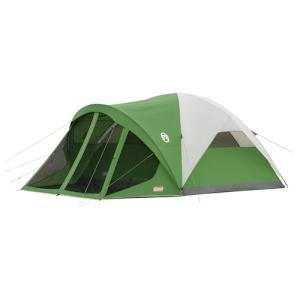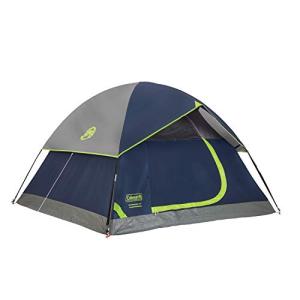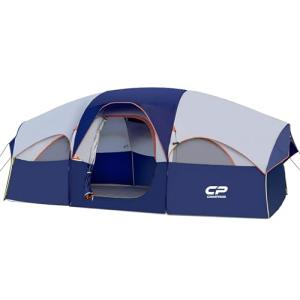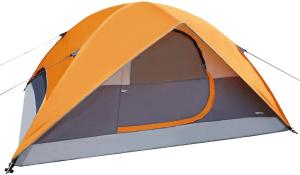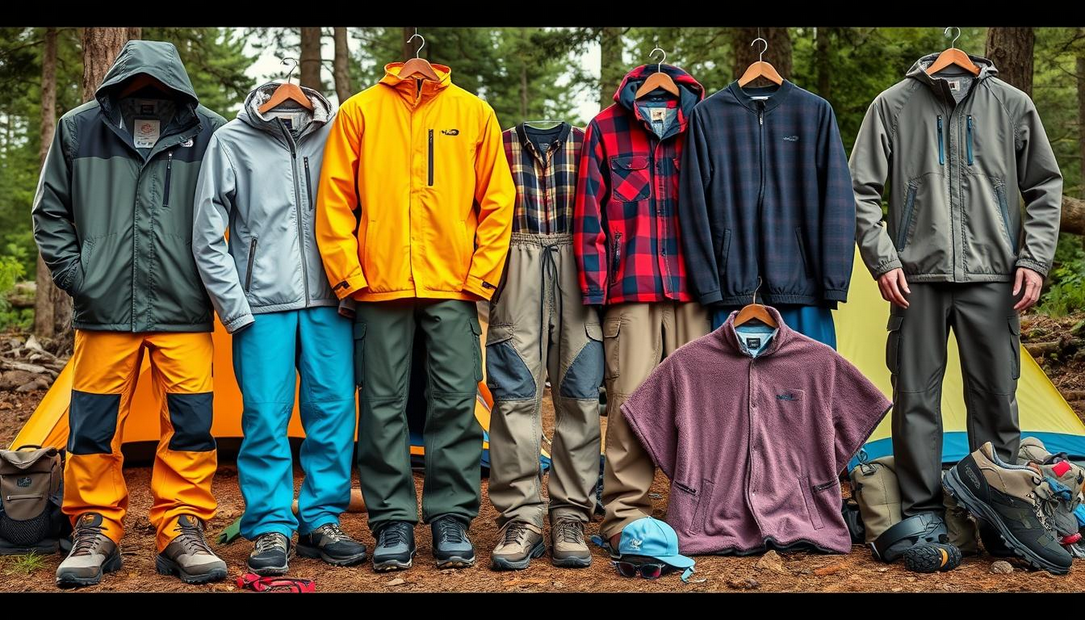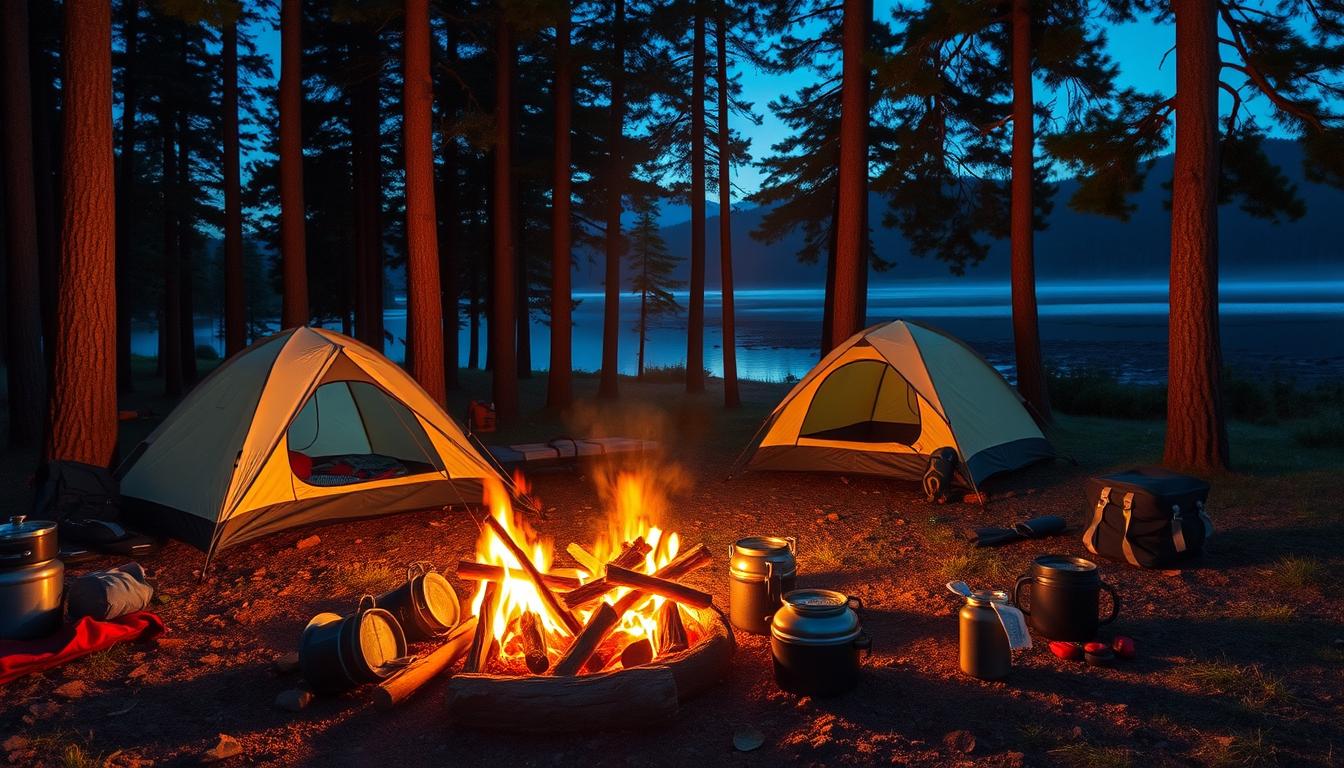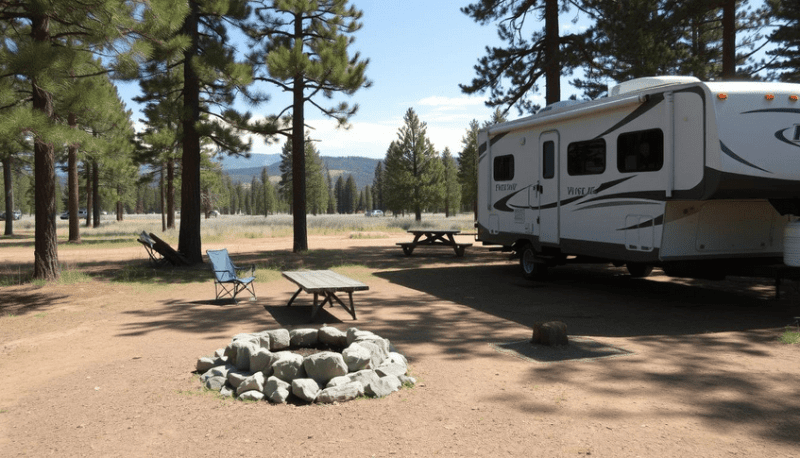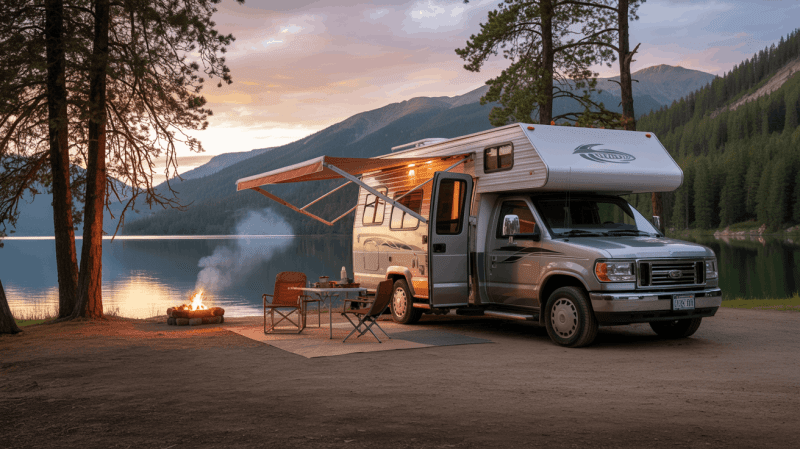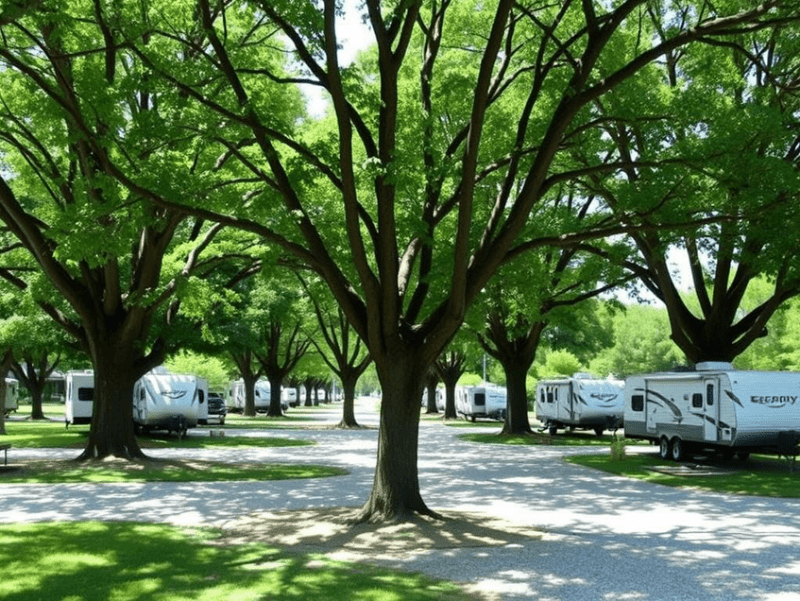Starting a camping adventure can be very rewarding. But, first-timers often make common mistakes. These errors can make a great trip difficult. We'll cover the top 10 mistakes to help you have a better camping experience.
Key Takeaways
- Avoid overpacking and focus on essential camping gear
- Familiarize yourself with equipment before the trip to prevent malfunctions
- Research campsite amenities and book reservations well in advance
- Properly store food to deter wildlife encounters
- Prepare for unexpected weather conditions and pack appropriate clothing
Essential Gear and Equipment Oversights
When it comes to camping gear checklist and outdoor survival skills, many first-time campers forget to test their gear at home. Knowing your camping gear essentials can prevent trouble when it's dark or rainy.
Testing Equipment Before the Trip
Before you leave, set up your tent and unpack your sleeping bags. Make sure all your camping gear works. This way, you can fix any problems and learn how to use it right, avoiding surprises at the campsite.
Must-Have vs Nice-to-Have Items
- Know the difference between camping gear essentials and nice-to-haves to avoid overpacking.
- Essentials include a good tent, sleeping bags, cooking gear, and first aid kits.
- Items like lanterns that also charge phones can save space.
Weather-Appropriate Gear Selection
Always check the weather forecast and pack for it. Choose outdoor survival skills and outdoor preparedness gear that fits the weather, like layers and rain gear.
https://youtube.com/watch?v=abbC3T7c5WE
| Must-Have Items | Nice-to-Have Items |
|---|---|
| Tent | Portable charger |
| Sleeping bag | Camp chairs |
| Cooking equipment | Hammock |
| First aid kit | Portable speaker |
Campsite Selection and Booking Blunders
Choosing the right campsite and booking at the right time are key to a great camping trip. Many new campers make mistakes here, leading to disappointment. Let's look at the common errors to avoid when picking and booking your campsite.
Understanding Campsite Amenities
Many new campers think all campsites are the same. But, the truth is, amenities can differ a lot. Some campsites have modern comforts like electricity and flush toilets. Others have basic facilities like pit toilets and no water.
Before you book, check what each campground offers. This way, you can pick one that fits your needs and wants.
Reservation Timing Strategies
Popular campsites fill up fast, especially during busy times. To get a spot, book early, sometimes up to a year ahead. Waiting too long can leave you with few choices or no spot at all.
Location Accessibility Considerations
How easy it is to get to your campsite matters a lot. Beginners should pick a site close to home, within 130 miles. This makes the trip easier and lets you quickly go home if needed.
Private campgrounds are usually easier to get to than national park sites. They're a good choice for those new to camping.
| Campsite Selection Considerations | Recommendation |
|---|---|
| Campsite Amenities | Research and understand the specific amenities offered at each campground to ensure it meets your needs. |
| Reservation Timing | Book your campsite as early as possible, sometimes up to a year in advance, to secure your preferred spot. |
| Location Accessibility | Choose a campground within 130 miles of your home, and consider private campgrounds for better accessibility. |
By thinking about these points, first-time campers can dodge common campsite selection and camping reservation mistakes. This way, they can enjoy a better and less stressful outdoor adventure.
Food Storage and Wildlife Safety Errors
Knowing how to store food properly is key for a safe camping trip. Many new campers forget this, leading to problems and safety risks. It's important to be aware of wildlife and how to keep food safe.
One big mistake is not storing food right. Leaving it out can attract dangerous animals like bears. Always use bear-resistant canisters in bear country. Also, keep coolers at 40°F or below to prevent food from spoiling.
It's also important to know about the local wildlife and follow food storage rules. Bad food handling can cause sickness, ruining your trip. Always be careful with food, even if you don't see big animals around.
| Common Camping Food Storage Mistakes | Percentage of Campers |
|---|---|
| Leaving food out in the open or improperly sealed | 60% |
| Failing to use bear-resistant canisters in bear country | 45% |
| Improper cooler temperature maintenance (above 40°F) | 33% |
| Lack of familiarity with local wildlife and campground guidelines | 72% |
By focusing on wildlife awareness and camping food storage, new campers can have a great time. They'll learn about wilderness survival and stay safe.
Top 10 Mistakes First-Time Campers Should Avoid
Going on your first camping trip is exciting, but it can also have its challenges. As a beginner, knowing the common mistakes is key. These errors can ruin your trip, from forgetting important gear to ignoring safety rules. By learning these mistakes and planning well, you can have a great camping experience.
Common Rookie Errors
Many first-timers overestimate their driving skills with RVs or trailers. This can lead to trouble on the road, causing delays and stress. Also, they often underestimate the time it takes to get to their campsite.
Not checking your camping gear before the trip is another mistake. This can cause problems when you really need it, ruining your plans and possibly risking your safety.
Safety Precautions
Keeping yourself safe should always be your first concern. Sadly, many beginners forget this. Not telling someone where you're going and when you'll be back can worry your family and make it hard for authorities to find you if something goes wrong.
Not knowing the local laws about campfires, wildlife, and other activities can also be dangerous. Knowing the rules of your campsite is important to avoid legal trouble and ensure a safe trip.
Essential Planning Tips
Making a detailed packing list and checking it twice is a smart move. It helps you remember all the important things you need, from clothes to cooking gear.
It's also wise to avoid bringing too many luxuries. Overpacking can make your trip a hassle. Instead, focus on the basics. Knowing the weather and packing the right clothes is also key to enjoying your trip.
Camping is a chance to relax and enjoy nature. By avoiding common mistakes and focusing on safety and planning, you can have a memorable and enjoyable camping trip.
Weather Preparation and Clothing Mishaps
Getting ready for the weather is key for a great camping trip. Many new campers pack for the weather they want, not the forecast. This can lead to being too hot or cold, even dangerous. It's important to check the weather forecast and pack the right camping clothes and gear.
Layering is a smart move. It helps you adjust to temperature changes during the day and night. Cotton clothes hold moisture, so choose moisture-wicking materials instead. Also, remember to pack rain gear, even if it's not raining. Nighttime temperatures can drop a lot, even in summer, so bring extra socks and the right wilderness weather shoes.
- Check the weather forecast regularly and pack accordingly.
- Embrace the art of layering for adaptability to temperature changes.
- Avoid cotton clothing and choose moisture-wicking materials instead.
- Pack rain gear, even if the forecast looks clear.
- Be prepared for significant temperature drops at night, even in summer.
- Pack extra socks and weather-appropriate footwear.
It's better to have weather preparedness gear and not need it, than to need it and not have it. By being proactive and packing the right clothes and gear, you can have a comfortable and outdoor clothing tips trip, no matter the wilderness weather.
"Packing for a trip is often more stressful than the trip itself, according to psychology studies."
| Camping Gear | Camping Clothes | Weather Preparedness |
|---|---|---|
| Tents, sleeping bags, camp stoves | Moisture-wicking base layers, insulating mid-layers, waterproof outer layers | Rain gear, extra socks, versatile footwear |
| Camping tools, first aid kits, navigation | Sun protection, cold-weather accessories | Layering system, weather monitoring |
Camp Setup and Organization Failures
Setting up your campsite right is key for a good camping trip. New campers often miss important steps, leading to problems. These mistakes can ruin what should be a fun outdoor adventure.
Tent Placement Guidelines
Always look for flat ground when setting up your tent. Stay away from dead trees or branches that could fall. Also, think about the wind direction to keep your tent stable and comfortable.
Campsite Layout Basics
Organizing your campsite is important for a peaceful stay. Place your tent with the wind behind it. Put your cooking area downwind to avoid smoke in your tent.
Keep food away from where you sleep to avoid animal problems.
Equipment Organization Tips
Organizing your camping gear is crucial. Use clear containers and label them for easy access. In RVs, secure items to prevent them from moving during travel.
For tent camping, set up areas for cooking, sleeping, and relaxing. This helps avoid mess and clutter.
"Efficiency may drop to less than 10 miles per gallon when hauling a camper with a regular vehicle."
| Camping Gear Essentials | Camping Gear Nice-to-Haves |
|---|---|
| Tent | Camping chairs |
| Sleeping bag | Hammock |
| Camping stove | Portable speakers |
| Cooler | Outdoor games |
| Headlamp | Outdoor shower |
Leave No Trace Principles Violations
First-time campers often forget the "Leave No Trace" rules. These rules help keep the wilderness beautiful and safe for animals. Sadly, many new campers don't know these rules, harming the places they visit.
Littering is a big problem. Things like food wrappers and plastic bottles can hurt the environment. It's important to take all trash with you and clean up any you find.
- Damage to vegetation: Walking on plants or taking rocks can hurt the area.
- Feeding wildlife: Giving food to animals can mess up their natural ways and be dangerous.
- Unattended campfires: Fires left alone can start big fires and damage the land.
It's key for all campers to know the Leave No Trace principles. This means planning, staying on paths, and taking care of waste. It also means respecting animals and other visitors. Following these rules helps protect the wilderness and supports sustainable camping.
| Violation | Impact | Solution |
|---|---|---|
| Littering | Disrupting the natural balance and harming wildlife | Pack out all trash, including biodegradable items |
| Damaging vegetation | Harming delicate ecosystems and plant life | Stay on designated trails and avoid removing natural objects |
| Feeding wildlife | Disrupting natural foraging habits and leading to dangerous encounters | Observe wildlife from a distance and do not provide food |
| Unattended campfires | Posing a fire risk and causing lasting environmental damage | Ensure campfires are properly extinguished before leaving the site |
By following the Leave No Trace principles, campers can enjoy nature without harming it. Camping ethics and wilderness conservation are vital for keeping our ecosystems healthy.
Conclusion
Mistakes are part of learning to camp, especially for beginners. Start with short trips near home to feel more confident. There's no one "right" way to camp; find what makes you comfortable.
Always put safety first, plan well, and respect nature. Seek advice from seasoned campers. With each trip, you'll learn more and enjoy camping more.
Planning an outdoor adventure is rewarding, and beginners should enjoy the learning. Camping lets you connect with nature and make memories that last. By avoiding common mistakes and staying open-minded, you can have amazing outdoor experiences.
To succeed in camping, start small, prepare well, and be flexible. With each adventure, you'll grow more confident and ready for camping's challenges. Explore the outdoors and make memories that will last a lifetime.
FAQ
Q: What are the top 10 mistakes first-time campers should avoid?
A: Common mistakes include overpacking and not knowing how to use gear. Also, forgetting to book campsites early and leaving essential items behind. Picking the wrong clothes for the weather and not storing food right are big no-nos.
Don't dry clothes by the fire, as it's dangerous. Make sure your tent and RV are on level ground. And, keep things secure while traveling.
Q: Why is it important to test equipment before a camping trip?
A: Testing your gear at home is key. It saves you from setting up in the dark or bad weather. Knowing how to use your equipment makes camping easier.
Q: How can first-time campers distinguish between must-have and nice-to-have items?
A: It's important to know what you really need. Must-haves include a good tent, sleeping bags, and cooking gear. Multi-functional items like lanterns that also charge phones can save space.
Q: Why is campsite selection and booking crucial for a successful camping trip?
A: Choosing the right campsite and booking early are key. Campgrounds, especially popular ones, fill up fast. Book up to a year in advance for holidays.
Know what amenities your campsite has. Not all sites are the same.
Q: How can first-time campers ensure proper food storage and wildlife safety?
A: Storing food right is vital for safety and to avoid wildlife. Use bear canisters in bear country. Keep coolers at 40°F or below for raw meats.
Q: What are some common rookie errors to avoid?
A: Don't overestimate your driving skills with an RV or trailer. Plan for extra travel time. Always check your gear and follow safety rules.
Always tell someone where you're going and when you'll be back.
Q: How can first-time campers prepare for changing weather conditions?
A: Weather is unpredictable, so pack for the forecast, not what you want. Check the weather often. Wear layers to adjust to temperature changes.
Q: What are the key considerations for proper camp setup and organization?
A: Setting up your camp right is key for comfort and safety. Find level ground for your tent. Avoid dead trees and branches.
Organize your gear well. Use clear containers and labels. In RVs, tie down items to prevent them from moving.
Q: Why is it important to follow Leave No Trace principles when camping?
A: Leave No Trace principles help keep nature beautiful. Plan ahead, travel on durable surfaces, and dispose of waste properly. Leave what you find and respect wildlife.
Minimize campfire impacts and be considerate of other visitors.
DISCLAIMER
The information contained on Best Camping Deals and our related pages is provided for entertainment and informational purposes only. It is not intended as a substitute for the advice of or treatment that may be prescribed by your physician or other health care provider.
Understand that you are solely responsible for the way this information is perceived and utilized, and do so at your own risk. In no way will Save on Sneaks be responsible for injuries or other problems that might occur due to the use of this website or any actions taken based on the content of this website. Giggle Cars will not be held responsible for the conduct of any companies and websites recommended within this site.
